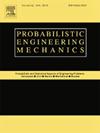Combined surrogate-assisted Bayesian optimization and comprehensive learning PSO method for parameter identification of ultra-high strength circular CFST short columns
IF 3
3区 工程技术
Q2 ENGINEERING, MECHANICAL
引用次数: 0
Abstract
The traditional approach to parameter identification of constitutive material models involves an iterative trial-and-error process that requires numerous costly finite element (FE) analyses as solvers for the corresponding discretized forward problems. This computational burden is particularly severe for composite structures like concrete-filled steel tube (CFST) columns with ultra-high-strength concrete. This paper presents an effective machine learning-based method to automate the identification of constitutive parameters for circular CFST (CCFST) short columns. A global sensitivity analysis leveraging a Gaussian process regression (GPR) model investigates the influence of each parameter on the column response, thereby providing the most influential parameters. Then, Bayesian optimization (BO) combined with a comprehensive learning particle swarm optimization (CLPSO) finds an optimal set of these parameters as the solution to a deterministic inverse problem formulated for the columns. Specifically, the CLPSO maximizes a highly non-convex expected improvement acquisition function formulated in each iteration of BO. By calibrating the numerical simulations of 14 CCFST columns against their experimental tests, BO delivers accurate parameters while avoiding the need for extensive FE analyses. The identified parameters reliably predict the responses of CCFST columns, demonstrating the accuracy and efficiency of the proposed identification method.

求助全文
约1分钟内获得全文
求助全文
来源期刊

Probabilistic Engineering Mechanics
工程技术-工程:机械
CiteScore
3.80
自引率
15.40%
发文量
98
审稿时长
13.5 months
期刊介绍:
This journal provides a forum for scholarly work dealing primarily with probabilistic and statistical approaches to contemporary solid/structural and fluid mechanics problems encountered in diverse technical disciplines such as aerospace, civil, marine, mechanical, and nuclear engineering. The journal aims to maintain a healthy balance between general solution techniques and problem-specific results, encouraging a fruitful exchange of ideas among disparate engineering specialities.
 求助内容:
求助内容: 应助结果提醒方式:
应助结果提醒方式:


